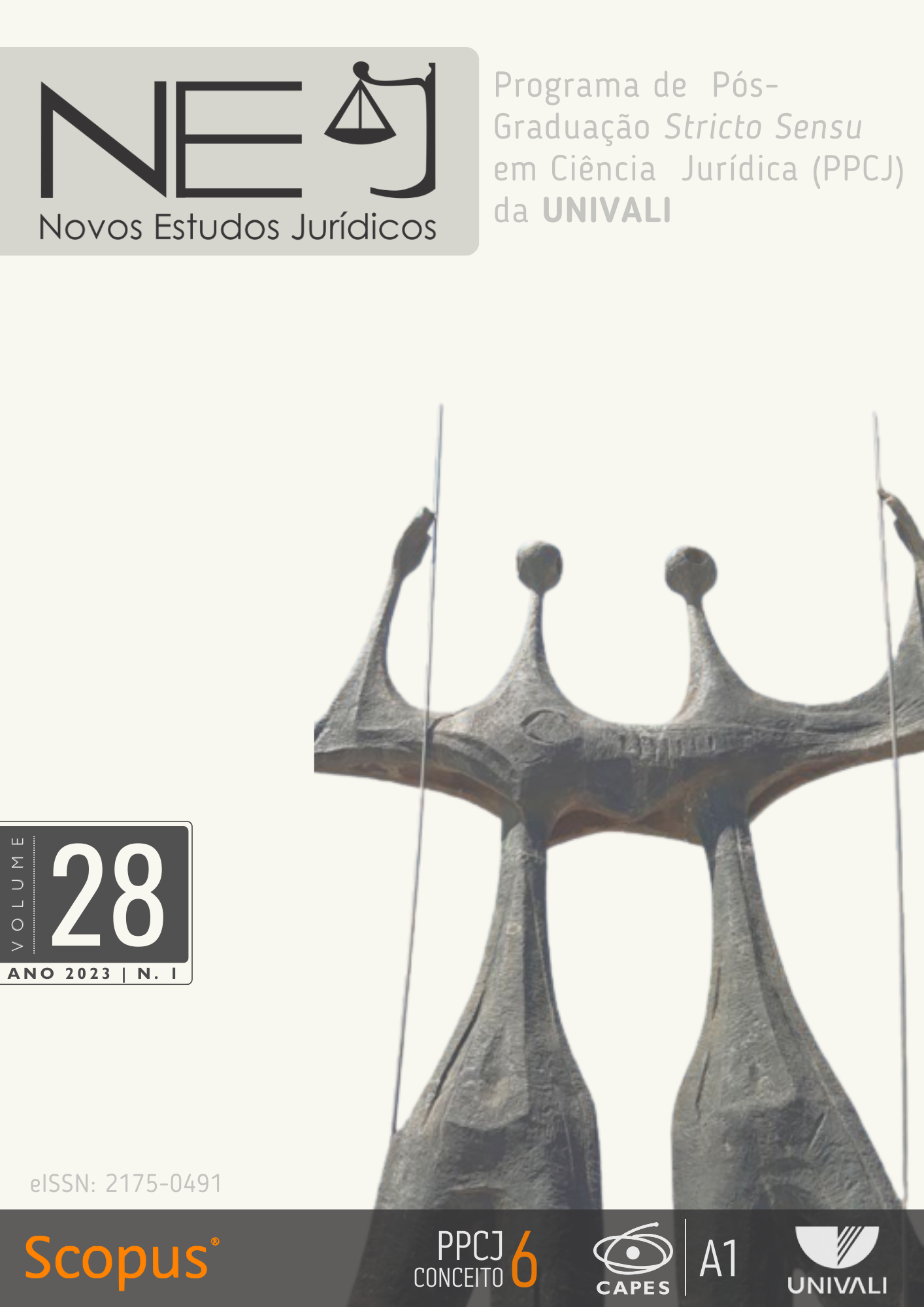THE TRANSNATIONAL “JUDICIAL DIALOGUE” STRATEGY IN THE GLOBAL SOUTH ON HOMOPHOBIA AND PENALTY OF HOMOSEXUALISM
DOI:
https://doi.org/10.14210/nej.v28n1.p2-16Keywords:
Dialogue judicial, Transnational Law, Constitucional CourtsAbstract
Contextualization: The study focuses on the decisions of the Constitutional Courts of Brazil, when discussing homophobia and transphobia and their assimilation to the crime of racism, and, in Kenya, when discussing the penalization of homosexual relations (anti-sodomy law), since both, when passing through legal guidelines involving individual liberties, decided in an absolutely divergent way, however, referencing precedents and judicial decisions of foreign Courts. The present research is justified mainly for two reasons: the progressive increase in the use of the transnational “judicial dialogue” strategy between national Courts and the evaluation of the rhetorical meanings of this strategy for the reasoning of judicial decisions.
Objective: This article aims to analyze the premises of the strategy called “judicial dialogue” transnational, in the context of Constitutional Courts inserted in the notion of the Global South, focusing on the legal treatment of homophobia and the penalization of homosexuality.
Methodology: For the development of this research, the inductive method was used, operationalized by the operational concept techniques, bibliographic research and jurisprudential analysis.
Results: As a result, the transnational judicial dialogue strategy must consider that individual identity and values often depend on how individual community members consider and value an individual personality. On the other hand, it is not recommended to enclose the Constitutional Courts for their namesakes or to disregard decisions produced abroad, as it would open a path of mismatch between local and global realities, whose effect would affect, among others, the protective system of Human Rights.
Downloads
References
ALLARD, Julie, GARAPON, Antoine. Os juízes na mundialização: a nova revolução do direito. Tradução de Rogério Alves. Lisboa: Instituto Piaget, 2005.
ARNAUD, André-Jean. Governar sem fronteiras. Entre globalização e pós-globalização. Rio de Janeiro: Lumen Juris, 2007.
COTTERRELL, Roger. What is transnational law? Law & Social Inquiry – Queen Mary University of London, London, n. 2, 2012. DOI: https://doi.org/10.1111/j.1747-4469.2012.01306.x
FRIEDMAN, Andrew. Beyond cherry picking; selection criteria for the use of foreign law in domestic constitucional jurisprudence. 2011.
HUMAN RIGHTS WATCH. This Alien Legacy. The Origins of “Sodomy” Laws in British Colonialism. December 2008, https://www.hrw.org/report/2008/12/17/alien-legacy/origins-sodomy-laws-british-colonialism. Acesso em 19 de abril de 2022
LOCCHI, Maria Chiara. Il movimento globale verso la depenalizzazione dell’omosessualità si arresta a Nairobi: la High Court del Kenya conferma la legittimità costituzionale dell’anti-sodomy law. Federalismi, Focus Africa, federalismi.it, 2019.
MUCHLINSKI, Peter T. ‘Global bukowina’ examined: viewing the multinational enterprise as a transnational law-making community. In:
TEUBNER, Günther (ed.). Global law without a state. Brookfield: Dartmouth, 1997.
NICOLINI, Matteo. “When Southern African Courts Join Judicial Conversation”: considerazioni introduttive a una ricerca sugli attori del dialogo costituzionale. In: CUKANI, Entela, DICOSOLA, Maria, NICOLINI, Matteo, POGGESCHI, Giovanni. Rischi e potenzialità del dialogo costituzionale globale. Per la costruzione di un ‘itinerario’ geo-giuridico mediante la comparazione nel diritto pubblico. Napoli. ESI, 2015.
NICOLINI, Matteo. La giustizia costituzionale in Africa australe. Bologna: Filodiritto Editore, 2015.
NOVAK, Andrew. Using International and Foreign Law in Human Rights Litigation: The Decriminalization of Homosexuality in Belize. Journal of Human Rights Practice, 2/2018. DOI: https://doi.org/10.1093/jhuman/huy014
NOVAK, Andrew. Transnational Human Rights Litigation. Challenging the Death Penalty and Criminalization of Homosexuality in the Commonwealth. Cham: Springer, 2020. DOI: https://doi.org/10.1007/978-3-030-28546-3
PAFFARINI, Jacopo. Modelli costituzionali e società di mercato. Lima: EGACAL, 2015.
PAFFARINI, Jacopo. O Transjudicialismo processual e as Cortes de Justiça estatais. In: FORTES, Vinícius Borges et ali. (Org.). Seminário acadêmico de direito IMED: o novo código de processo civil e os desafios para o direito e para a democracia. Carazinho: Deviant, 2015.
SANTOS, Cecília MacDowell dos. A mobilização transnacional do direito. Portugal e o Tribunal Europeu dos Direitos Humanos. Coimbra: Almedina, 2012.
SASSEN, Saskia. Territorio, autoridad y derechos. De los ensamblajes medievales a los ensamblajes globales. Buenos Aires: Katz, 2015.
SLAUGTHER, Anne-Marie. A tipology of transjudicial communication. University of Richmond Law Review, Richmond, v. 29, 1994-1995.
STAFFEN, Marcio Ricardo. On the Authority of Transnational Law. Estudios Socio-Jurídicos, Bogotá, v. 23, n. 1, 2021. DOI: https://doi.org/10.12804/revistas.urosario.edu.co/sociojuridicos/a.8175
VON BENDA-BECKMANN, Franz; VON BENDA-BECKMANN, Keebet; GRIFFITHS, Anne. The power of law in a transnational world. New York: Berghahn, 2012,
VON BOGDANDY, Armin. Common principles for a plurality of orders: A study on public authority in the European legal area. International Journal of Constitutional Law, Oxford: v 12, n 4, out. 2014, p. 983 DOI: https://doi.org/10.1093/icon/mou066
WAITES, Matthew. The new trans-national politics of LGBT human rights in the Commonwealth: what can UK NGOs learn from the global South?. STELLA, Francesca., TAYLOR, Yvette, REYNOLDS, Tracey, ROGERS, Antoine (eds.). Sexuality, Citizenship and Belonging: Trans-National and Intersectional Perspectives. London: Routledge, 2016.
Downloads
Published
How to Cite
Issue
Section
License
Na qualidade de autor(es) da colaboração, original e inédita, sobre o qual me(nos) responsabilizo(amos) civil e penalmente pelo seu conteúdo, após ter lido as diretrizes para autores, concordado(amos) plenamente com as Políticas Editorias da Revista Novos Estudos Jurídicos - NEJ e autorizo(amos) a publicação na rede mundial de computadores (Internet), permitindo, também, que sua linguagem possa ser reformulada, caso seja necessário, sem que me(nos) seja devido qualquer pagamento a título de direitos autorais, podendo qualquer interessado acessá-lo e/ou reproduzi-lo mediante download, desde que a reprodução e/ou publicação obedeçam as normas da ABNT e tenham a finalidade exclusiva de uso por quem a consulta a título de divulgação da produção acadêmico científico.





























